Use the Wikipedia app.
🧪 #Knowledge
www.nature.com/articles/d41...
Use the Wikipedia app.
🧪 #Knowledge
www.nature.com/articles/d41...
SARS-CoV-2 Infection Is Associated With an Increased Risk of Hospital-Treated Infectious Mononucleosis due to EBV: National Register-Based Cohort Study
onlinelibrary.wiley.com/doi/10.1002/...
Screenshot from latest Science for ME weekly update
#LongCovid #PASC

SARS-CoV-2 Infection Is Associated With an Increased Risk of Hospital-Treated Infectious Mononucleosis due to EBV: National Register-Based Cohort Study
onlinelibrary.wiley.com/doi/10.1002/...
Screenshot from latest Science for ME weekly update
#LongCovid #PASC
It feels like this year, we’ve made a significant step towards understanding the pathophysiology of ME/CFS.
A brief overview of the studies that caught our eye.

It feels like this year, we’ve made a significant step towards understanding the pathophysiology of ME/CFS.
A brief overview of the studies that caught our eye.
It feels like this year, we’ve made a significant step towards understanding the pathophysiology of ME/CFS.
A brief overview of the studies that caught our eye.


Sanofi also expressed an interest in gaining a better understanding of the disease and its mechanisms.
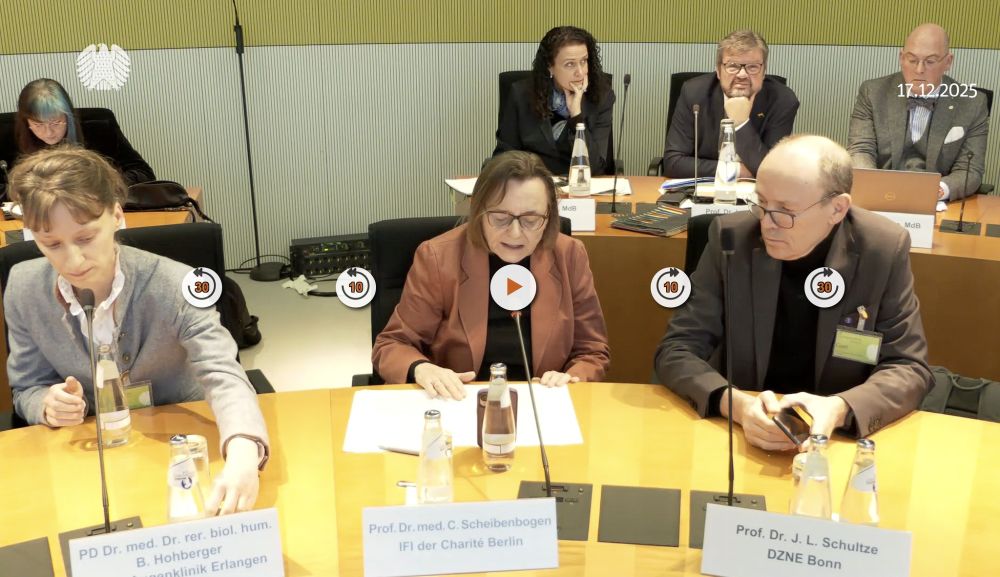
Sanofi also expressed an interest in gaining a better understanding of the disease and its mechanisms.
Some people felt it was dismissive of several findings in the ME/CFS field, so I want to give some more background and context.
Written by Prof. Emeritus Jonathon Edwards and members of the Science for ME forum. A valuable text, useful to bookmark. A couple of quotes from key paragraphs 👇
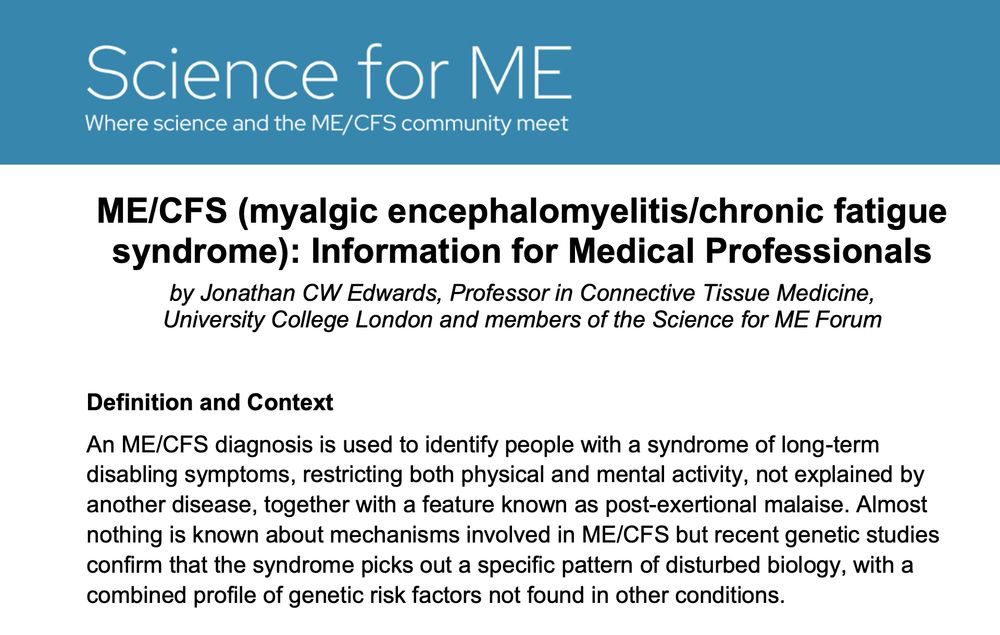
Some people felt it was dismissive of several findings in the ME/CFS field, so I want to give some more background and context.
You can sign the petition here:

You can sign the petition here:
Shows recovery rates in all trial arms were low, using the criteria the PIs promised in their own protocol
tandfonline.com/doi/full/10....
#MEcfs #CFS

Shows recovery rates in all trial arms were low, using the criteria the PIs promised in their own protocol
tandfonline.com/doi/full/10....
#MEcfs #CFS

The study will compare the immune profile of ME/CFS and Long Covid patients, with 250 patients in each group.

The study will compare the immune profile of ME/CFS and Long Covid patients, with 250 patients in each group.
Infections are traditionally viewed as having two outcomes: you either die or fully recover. But there are reports of post-acute sequelae after multiple infections, not just after COVID-19...

* Excluding overlapping syndromes such as fibromyalgia, Long Covid, POTS, MCAS, hEDS, etc., which are equally poorly understood.

* Excluding overlapping syndromes such as fibromyalgia, Long Covid, POTS, MCAS, hEDS, etc., which are equally poorly understood.
- 29% dropped out
- no placebo control group
- physical component scores showed few improvements
A brief breakdown...
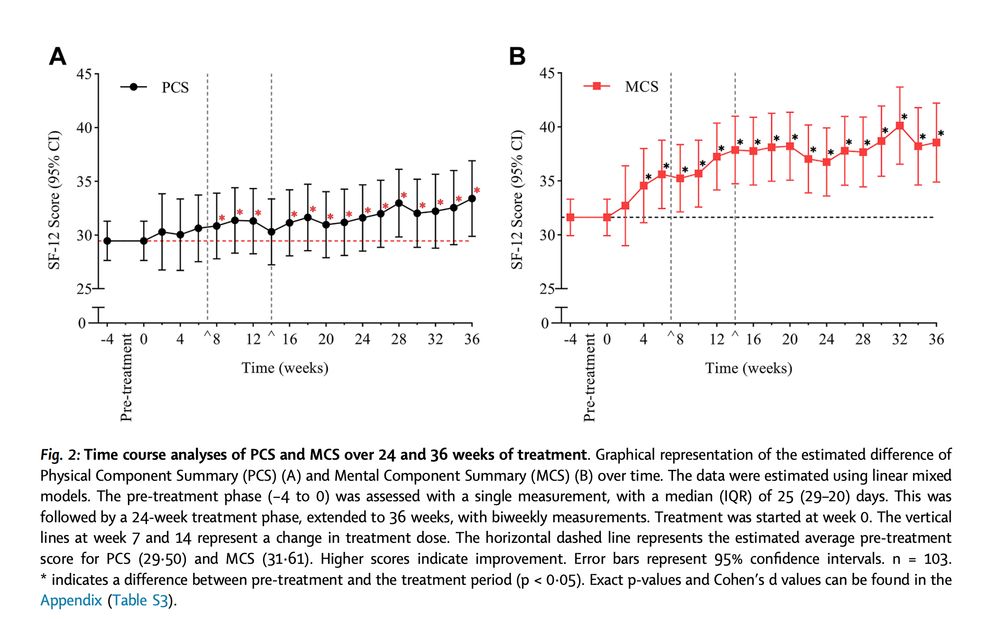
- 29% dropped out
- no placebo control group
- physical component scores showed few improvements
A brief breakdown...
Mark Bonnar posted this 2 days ago.
He’s still fundraising for @actionforme.bsky.social as part of the Big Give Christmas Challenge.
I’ll link the video below

Mark Bonnar posted this 2 days ago.
He’s still fundraising for @actionforme.bsky.social as part of the Big Give Christmas Challenge.
I’ll link the video below
The 259 genes that were most associated with ME/CFS pointed to "neurological dysregulation, inflammation, cellular stress responses, and calcium signaling"

The 259 genes that were most associated with ME/CFS pointed to "neurological dysregulation, inflammation, cellular stress responses, and calcium signaling"
The infrastructure first built for HIV, then used for Long Covid in the LIINC study, will now also help with studying pre-pandemic ME/CFS
The research will focus on gut biopsies and PET-CT scans.
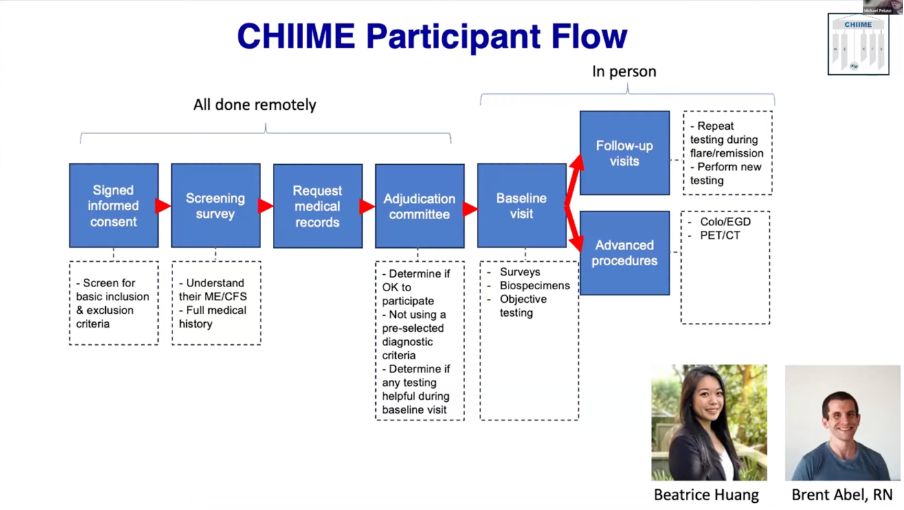
The infrastructure first built for HIV, then used for Long Covid in the LIINC study, will now also help with studying pre-pandemic ME/CFS
The research will focus on gut biopsies and PET-CT scans.
There are, however, several possible explanations for these findings.

There are, however, several possible explanations for these findings.
Unfortunately, it's almost fully based on self-reported data and questionnaires.
There are still almost no studies that looked deeper into MCAS in ME/CFS using proper biological tests.

Unfortunately, it's almost fully based on self-reported data and questionnaires.
There are still almost no studies that looked deeper into MCAS in ME/CFS using proper biological tests.
Today, we are proud to launch the Overlapping Illness Alliance, a coalition of charities working to improve recognition, care and support for those living with complex, overlapping conditions.

Today, we are proud to launch the Overlapping Illness Alliance, a coalition of charities working to improve recognition, care and support for those living with complex, overlapping conditions.
We’ve already had over 2000 responses - thank you to everyone who’s taken part so far 🧡
Take part, read our FAQs, and find out more here: www.actionforme.org.uk/research-campaigns/our-research-work/big-survey/


We’ve already had over 2000 responses - thank you to everyone who’s taken part so far 🧡
Take part, read our FAQs, and find out more here: www.actionforme.org.uk/research-campaigns/our-research-work/big-survey/
The research team expect to complete recruitment very soon, with all participant activities completed by February next year.
meassociation.org.uk/2025/10/upda...

The research team expect to complete recruitment very soon, with all participant activities completed by February next year.
meassociation.org.uk/2025/10/upda...
They have created ME/CFS fellowships: 6-month research stays with funding of up to € 40,000.
The call is co-funded by the WWTF (a big non-profit in Vienna dedicated to research and science) and has a total budget of € 200.000.
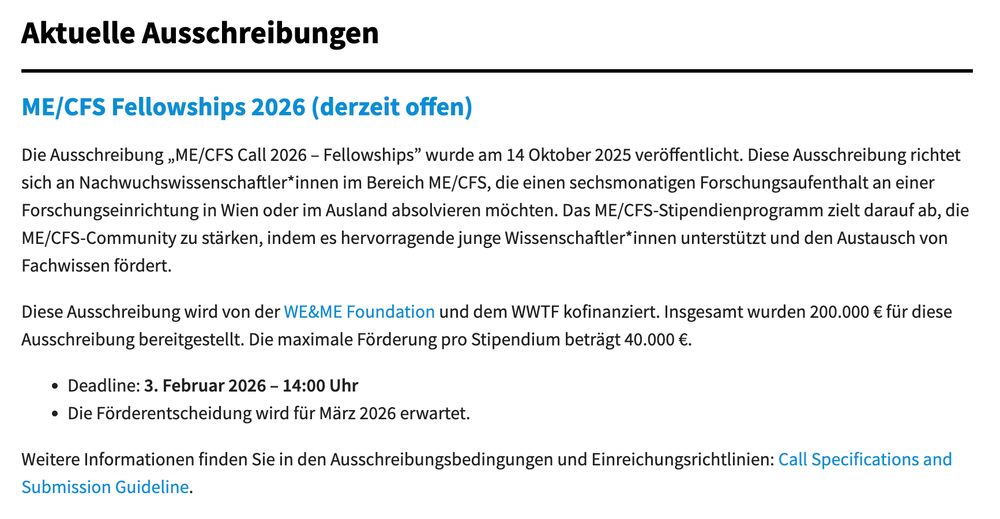
They have created ME/CFS fellowships: 6-month research stays with funding of up to € 40,000.
The call is co-funded by the WWTF (a big non-profit in Vienna dedicated to research and science) and has a total budget of € 200.000.

